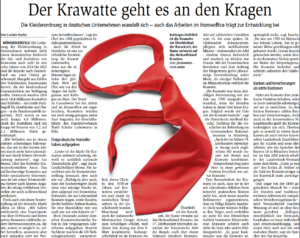Decline in turnover in the tie business or is the tie in danger: Is style at risk?
In recent days, the press nationwide has reported an alarming decline in tie sales in Germany. From 14.4 million to 4.8 million euros in just one decade - these are numbers that give cause for thought. But behind these numbers, there may be more than just an economic decline. Could it be that we are generally neglecting the value of a well-groomed appearance?
It is undeniable that the way we deal with clothing has changed. Many of us value branded polos, designer shirts, and expensive trousers, but often lack a sense of style and class. We see men wearing expensive clothes, but without taste, they appear awkward and incomplete.
When we look beyond the German borders, especially to France, Italy, and Spain, we often notice a completely different attitude towards clothing. We travel there and are impressed by the elegance and sophistication of the people in their outfits. It seems as if they have an innate understanding of style.
In the business environment, the tie is still a common accessory. Most men stick to it because they recognize that it's not just about wearing a symbol, but about an attitude, a style, and self-confidence. Have these markets experienced a decline in tie business revenue? No.
The decline in tie business revenue in Germany is therefore not only an economic phenomenon, but also an alarm signal for a possible loss of style and class. It's not just about brands or money - it's about the awareness of aesthetics and respect for one's own appearance.



What's new?
Fashion comes and goes, and for 20 years it has been said that the tie is dead. Nevertheless, major fashion labels such as Valentino, Prada, or Celine presented the tie in their latest collections at the beginning of the 2024 fashion shows in Milan (Men's Fashion Week in Milan) and Paris (Paris Fashion Week). Are we facing a comeback once again?
Perhaps it is time for us to refocus on the essentials. We should not only consider clothing as a mere necessity, but as an expression of our personality and our values. The tie may be just a small accessory, but it can say a lot about the wearer - about their taste, their style, and their attitude towards others.
It is time for us to refocus on what is truly important - not only in the realm of fashion, but in all areas of our lives: style, class, and respect for ourselves and for others.
Why do our politicians like Federal Chancellor Scholz and our Federal Minister for Economic Affairs and Climate Protection, Robert Harbeck, wear a tie for formal occasions or foreign trips?
The answer to this question could be multifaceted. First of all, the tie symbolizes tradition and seriousness. In political and diplomatic circles, a lot of importance is placed on etiquette, and wearing a tie can help convey respect and authority. Furthermore, the choice of a tie can also send a message or express political affiliation.
Furthermore, wearing a tie can also be seen as a sign of respect towards the host country or the organizers. In many cultures, guests are expected to dress accordingly, and wearing a tie can be interpreted as a sign of politeness and goodwill.
Finally, wearing a tie can also help maintain a positive image and build trust with the citizens. In public, political decision-makers are often judged based on their outward appearance, and wearing a tie can help convey an image of professionalism and competence.
Wearing a tie can have various meanings for political leaders - from tradition and seriousness to respect and image maintenance. And perhaps this practice can also help to maintain the significance and value of the tie in today's society.
It is time for us to focus again on what is truly important - not just in the field of fashion.






